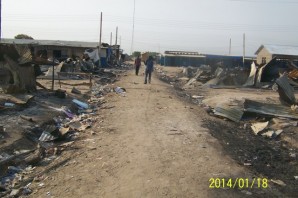 South Sudan was extremely built of weak institutions, nearly all of which are incapable of effectively delivering on the needs of the peoples of South Sudan.
South Sudan was extremely built of weak institutions, nearly all of which are incapable of effectively delivering on the needs of the peoples of South Sudan.
These needs included good governance, transparence and peaceful coexistence to improve people’s living conditions, and create opportunities for self-actualization for all South Sudanese regardless of their ethnic or religious background.
However, the weak institutions have not put in place policies to embrace diversity, rather caused disunity and destructive ethnic mobilization.
More inter-ethnic, violent confrontations between groups have now re-emerged and have become a major constraint to peaceful coexistence.
The historical grievances among South Sudanese communities continue to affect relations between ethnical groups and individuals, battle of revenge among communities escalated and new tensions emerge from old wounds. The inter-ethnic conflict generally has escalated in a worrying manner.
The Government of South Sudan should working in consultation with local communities to engage in reforms that are well defined and reflect the values of the entire nation.
South Sudan further needs institutional reforms to secure productive nation, a nation that can significantly enhance peaceful coexistence of the country’s diverse ethnic and religious groups to encourage and promote peace.
Securing a productive state in South Sudan must begin with participatory constitution making. Today, many people are governed by rules that they do not understand, respect or accept.
In addition, most of these peoples do not understand how and why these constitutional rules were selected. The constitution making in this country was dominated and controlled by politically well-connected interest groups.
Thus, South Sudan must adopt a participatory approach to constitution making and state reconstruction. Otherwise, it would end up with a set of institutional arrangements that is irrelevant to the lives of the South Sudanese.
The constitution making in South Sudan must also be bottom-up, people-driven and inclusive. All citizens, regardless of their educational achievements, wealth status, ethnic origin, or religious affiliation, must be granted the facilities to participate fully and effectively in constitution making process.
South Sudan needs a constitution that is connected with the Universal Declaration of Human Rights.
Participation of all of South Sudan’s relevant stakeholder groups in constitution making must be maximized so that the outcome reflects all communities’ desires, values, aspirations, traditions, and customs.
